When City Fell Foul of Edwardian Financial Fair Play (Pt 11)
Eleven: The Bombshell
On 31 May 1906, Spanish anarchist Mateu Morral threw a bomb at the wedding procession of King Alfonso XIII in Madrid, killing 24 people and wounding more than 100.
That same day in London, the FA commission set up to investigate City detonated its own explosive device. Its shockwaves would affect Manchester football for years to come.
For breaching the maximum £4 a week wage rule, and receiving bonuses of between £1 and £5 a match, 17 City players were suspended for seven months and banned from ever playing for City again. The players were also fined a combined total of £900.
Players fined:
Meredith (£100), Livingstone (£100), Hynds (£75), McMahon (£75), Hillman, Turnbull, Booth, Burgess, Frost, Bannister, Dearden, Gillespie and Holmes (all £50), Edmundson, Davidson, Lyon, Ashworth (all £25)
Chairman John Allison and director J H Davies were suspended for a year, while former chairman Waltham Forrest received a life ban. The remaining directors, who were not accused of wrongdoing, were asked by the FA to resign. The club was also fined £250.
But most shockingly of all, the FA decreed that manager Tom Maley “shall not be allowed to act again in any capacity in connection with football under the jurisdiction of the Football Association”.
According to the Daily Chronicle,
‘The history of the game since professionalism was recognized contains no parallel to this sweeping punishment.’
The Manchester Evening News’ London corresponent reported that four City directors, who ‘were all in the neighbourhood of the Football Association offices when the decision was announced’ were ‘too seriously affected by the news to speak.’
They refused to comment the following day. But at a meeting of City shareholders in Ardwick on 1 June the newly elected chairman of its emergency committee, John Prowse, declared (to cries of “Shame”) that there was “some prejudice or spite” behind the sanctions.
City were certainly guilty of breaking the rules. During the investigation directors had admitted that part of the gate money had been placed in secret accounts before being passed on to players. But as legendary sportsman C B Fry had declared 18 months earlier:
“I do not see how any big professional club can obey the laws of the Football Association and exist.’
The Manchester Evening News added:
‘If City were not prepared to break the laws, other clubs were. If City were not disposed to pay a bonus for winning a match, other clubs were. If City declined to pay a player more than £10 for “signing on” and £4 per week wages, other clubs were ready to do both.’
The sense that City had been unfairly singled out was certainly not confined to Manchester’s newspapers. As the Birmingham Daily Post observed:
‘He would be a bold man who would assert that the deplorable revelations with regard to Manchester City have told the whole story of evasion. An atmosphere of evasion seems to pervade so many transfers of players from one club to another that one cannot avoid suspecting that “inducements” not recognised by the Association are far too commonly offered.’
The recriminations soon followed. On 4 June Athletic News claimed that Meredith, whose evidence had been crucial to the FA’s case,
‘took a course which amounted to revenge after he had been simply killed with kindness by the clubs whose colours he wore.’
Meredith hit back in a letter to Athletic News the following week, claiming the criticism was “neither manly or fair”. He calculated his total losses at £1,674, more than 13 times the average yearly wage of a manual worker.
At a shareholders meeting on 14 June, Maley left little doubt about the injustice of the FA sanctions, declaring that if similar inquiries were made elsewhere “not more than four out of the twenty clubs in the First Division of the League would come out scatheless”. New chairman W.A. Wilkinson even informed shareholders that sticking to the rules was already making it hard to attract new players.
Two years earlier City had stood on the brink of an era that could have been as glorious as the present one. It would be 28 years before the club won another major trophy.
But according Athletic News, the sanctions could have been a great deal worse. It claimed that during the FA investigation,
‘the Commissioners did seriously consider whether the club should be allowed to continue.’
City’s makeshift side lost the opening three games of the 1906-07 season, scoring three goals and conceding 16. A relegation battle was now inevitable.
But the club at least lived to fight another day.
Part Twelve will be published on Saturday 18th May.
You can subscribe for free, below, and have it sent straight to your inbox.





Wonder if there was an equivalent of Simon Jordan spouting anti city nonsense in the media back then ? Corruption in professional sport is nothing new